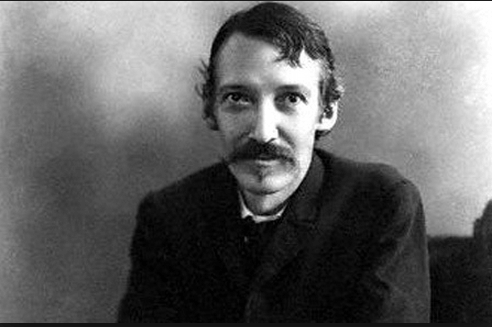
Happy birthday, Robert Louis Stevenson! 164 sure looks good on you.
While scholars have largely dismissed Stevenson's work as "children's literature" (because of Treasure Island) or relegated it to the horror genre (not sure what's wrong with that either), recent intellectuals—like myself!—are casting the author in a new light. And if you actually read The Strange Case of Dr. Jekyll and Mr. Hyde, there's some solid life lessons buried inside this dark ditty. Despite his (relatively) short life of 44 years, Stevenson assuredly racked up some wisdom.
Before we swift through the pearls in this text, let's do a brief recap.
The Strange Case of Dr. Jekyll and Mr. Hyde follows an investigation—led by a man known as Mr. Utterson—regarding the strange relationship between the esteemed Dr. Jekyll and violent lunatic, Mr. Hyde. Not only is Mr. Hyde set to inherit Dr. Jekyll's money, but Dr. Jekyll spends a great deal of time rationalizing this odd friendship. Oh, and we never see them together. . . as it turns out (spoiler alert!) Mr. Hyde and Dr. Jekyll are actually one in the same; a science experiment, gone awry, created Mr. Hyde. And as long as I'm ruining books with spoilers galore, they/he die/s too.
1. Notice Bad Vibes
When Mr. Utterson—the boring lawyer, who tells this tale for whatever reason—first witnesses evil Mr. Hyde, Utterson knows something is terribly awry. As he explains to Mr. Enfield, "there is something wrong with his appearance; something displeasing, something downright detestable. I never saw a man I so disliked, and yet I scarce know why . . . I can make no hand of it." Later, Mr. Hyde is described as giving "an impression of deformity without any nameable malformation."
A year later, Mr. Hyde clubs a random dude to death with a cane. So yeah, this first impression served for a solid assessment.
Takeaway: Get a bad feeling about someone? Trust it. He's probably mad scientist-created entity, anyway.
2. Be Wary When A Friend's Behavior Does a 180
Previously, Dr. Jekyll was the cock of the walk. He made tons of money, but was charitable. Friends (who were, allegedly, "all judges of good wine") surrounded Dr. Jekyll constantly. Even when Dr. Jekyll was confronted by Mr. Utterson (regarding his will), Dr. Jekyll handled the inquiries with ease and kindness. Then, he gets ultra reclusive out of nowhere. Guests are refused. Dinner parties are not happening. When Mr. Utterson randomly runs into him, Dr. Jekyll is a shell of a human.
Why? Mr. Hyde had killed someone, so Dr. Jekyll was hiding to prevent more atrocities. After all, Dr. Jekyll was responsible for creating the monster.
Takeaway: When your friend starts acting out of character, freak out and get to the bottom of it. Works like a charm.
3. When in Doubt, Describe the Hell out of Everything
Throughout the novella, Stevenson provides explicit descriptions of even mundane things. Case in point: "It was a fine dry night; frost in the air; the streets as clean as a ballroom floor; the lamps, unshaken by any wine, drawing a regular pattern of shadow. By ten o'clock, when the shops-" OMG WE GET IT. Truthfully though, it's a rad tactic when you consider the context. The story is shrouded in mystery, but the characters are familiar with their surroundings. Naturally, Stevenson exhausts the familiar as a means to cope with the spooky Mr. Hyde lurking about.
Takeaway: Lost? Focus on your surroundings. Confused? Describe the situation, maybe you can make sense of it.
4. Don't Underestimate the Value of Written Documents
If this story happened today, Mr. Hyde would have simply hacked all of Dr. Jekyll's accounts. All social communication, bank transactions, data entry etc. would have been infiltrated by Mr. Hyde. He could have destroyed everything of importance with a click of a button, as opposed to utilizing physical destruction (which takes way more time and effort). Mr. Utterson ultimately falls in possession of documents detailing the case: hand-written letters with explicit instructions, descriptions and fear. Dr. Jekyll himself even leaves behind a written account from his perspective.
Takeaway: Birthday cards trump Facebook posts. Plus, maybe you should actually print those pictures saved in your phone. Go make a scrapbook or something.
5. People are Complex
Upon finding Dr. Jekyll's written record of the events, the reader learns that he is a firm believer in "man's dual nature." This means that people are not solely "good" or "bad." Instead, they're a combination of sorts. Stevenson (narrating as Dr. Jekyll in this instance) puts it well: "I was in no sense a hypocrite; both sides of me were in dead earnest; I was no more myself when I laid aside restraint and plunged in shame, than when I laboured, in the eye of the day, at the furtherance of knowledge or the relief of sorrow and suffering." In short, Dr. Jekyll speculated that individuals are comprised of two parts that struggle endlessly with each other. Mr. Hyde was created when Dr. Jekyll wished to shed unlikable aspects. Then, as you see, Mr. Hyde truly took on a life of his own and wrecked havoc.
Takeaway: Live in harmony with your flaws. Let's say you have no filter, and you're constantly offending people. This annoying—and perhaps offensive—habit has its merits though. You stroll up to a friend and say, "damn, you look like hell." No one else had the courage to say it and as it turns out, your friend has an undiagnosed health problem they'd been reluctant to address. Perhaps you just saved a life! Ain't nobody perfect—I know, what a shock!—but we can learn to appreciate positive aspects of seeming shortcomings. I, for one, can be a bit of a Mr. Hyde if I haven't gone running for awhile. This motivates me to run, which is healthy and fun and keeps my ass tight and high. Find your own—just saying is all.
